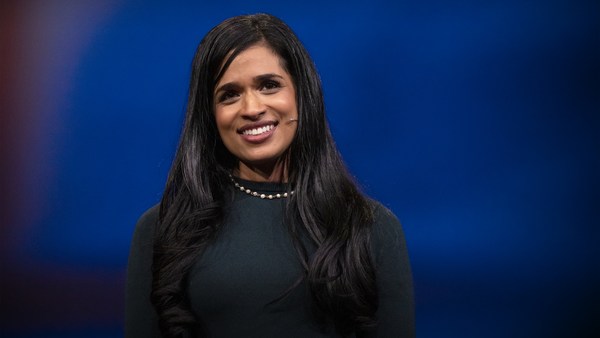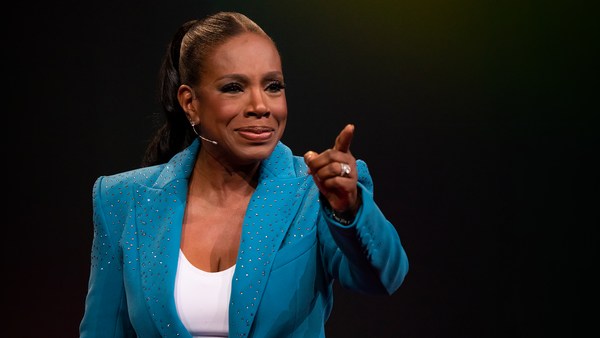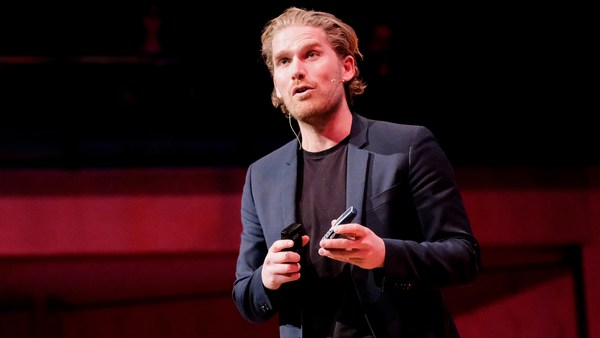I do not suppose to know everything. And those closest to me, they might say, I don't really know much at all, but -- One thing that I know to be true beyond the shadow of a doubt is this. The surest way to fail in life is to set a goal.
(Laughter)
Now, unfortunately, I found this out through excruciating pain, but hopefully in the next nine minutes, I can convince you, too, that this is true, without the pain. Unless, of course, you consider listening to me painful.
OK. The year was 2011. I was seeking to become a multimillionaire by the age of 21. So how was I going to do this? It was simple. I was going to leave college at the University of Texas one year early. I was going to leave after my junior year and declare for the National Football League draft. In order to do this, however, you have to submit your resume to the NFL. A resume in football, it is your highlight tapes from your years playing prior. So I submitted my football tape from my freshman, my sophomore and my junior year. The NFL sent me back a letter. It simply read, "Dear Emmanuel, you will not be drafted in the first three rounds."
Excuse you. I won't be drafted in the first three rounds? So what did I do, TED audience? It's simple. I set a goal that day. But you know what they say about goal-setting. You've got to write it down, commit it to memory.
So I highlighted the sheet of paper. “Dear Emmanuel, you won’t be drafted in the first three rounds,” and I put it above my bed in my condo in Austin, Texas. Every morning I woke up, I looked at it. "Dear Emmanuel, you won't be drafted in the first three rounds." Every night before I went to sleep, I looked at it. "Dear Emmanuel, you won't be drafted in the first three rounds." I worked tirelessly my senior year in college with one goal in mind. Be drafted in the first three rounds of the NFL draft. Those are the most prestigious rounds after all. 6am workouts in college, study hall, class. I'm doing it all, with one goal in mind.
Well, fast forward one year later, I'm at the NFL Combine. The NFL Combine, it is the job interview. I'm in front of 32 billionaires. 32 of the richest men in America, if not the richest men in the world. They are the owners of every NFL team. I'm running the 40-yard dash. The 40-yard dash is one of the testing metrics you use at the NFL Combine with millions of dollars on the line. The faster you run, the higher you get drafted.
I take my mark. I proceed to run. I hear pop, pop, pop. I keep running. I think my heels are clicking. Pop, pop, pop. I clutch my quad, I fall to the ground. It was my quad being torn off the bone.
(Audience: Oh!)
I ripped my quad off the bone, I’m falling [to the] ground in agony in front of these 32 billionaires.
I didn't get drafted in the first three rounds of the NFL draft. I made a decision that day, in that moment, to stop setting goals. My self-esteem, ruined. Self-efficacy, ruined. That last year of my life seemingly gone to waste because I had one goal, y'all. It was simple. Be drafted in the first three rounds. Then I tore my quad, and it all fell apart. What I failed to mention thus far is why I tore my quad. Two days prior at the NFL Combine, I weighed in at 240 pounds. In the NFL, the bigger you are, the better. But as you all know, weight, it don't move all that fast. So I cut 10 pounds within two days. I ran the 40-yard dash two days later at 230 pounds, dehydrated, dieted for two days. Why? Because I was so focused on my goal that I caused harm to myself.
It's not that goals don't add value. It’s just that the risk of goal-setting, it is greater than the potential reward.
Think about it in your own life for a moment. Maybe you had the goal of being in a relationship. So you ignore the toxic behavior. Think about it in your own life. See, one of my greatest accomplishments to date, being an NFL player, because ultimately I did play for four years, I view negatively because I didn't hit my goal. Maybe that's the same for some of you. Maybe you have the goal of reading a certain amount of books in a year. You've become a much more proficient reader, but you didn't hit your goal. Maybe you had a goal of making a certain amount of money for your business. You are a thriving entrepreneur, but you didn't hit your goal.
I left the NFL. I became a content creator where I would live a much more limitless life. I'll get to that more here in a moment.
The question now is why in the world do we set goals? Well, first, let's define a goal. A goal, by definition, it is the end towards which effort is aimed. But why would I start something with the end in mind? In working on my master’s degree in sports psychology, I focused on goal-setting, I wrote my final thesis on it, and I realized we set goals for three primary reasons. The first. We've been indoctrinated with this belief that we have to set a goal to achieve. There's a popularized study, which has since been debunked, which said the person who writes their goals down and commits them to memory, they will earn twice as much money as the person who doesn't. So what you want me to believe is the difference between one million dollars and 500,000 dollars is this? What you want me to believe is the difference between 100,000 dollars and 50,000 dollars is simply this? Can't be.
Now, these ideas aren't completely off-base. The problem is very simple. They're misidentifying causation and correlation. Surely there is a correlation between the person who was willing to go the extra mile and write their goal down and the person who's willing to go the extra mile in their business. But no, the reason you're making twice as much money is not because you wrote your goal down.
The second reason we set goals, goals give us a North Star. Motivation. As if we'd just be wandering around life aimlessly if we didn't set a goal.
The final reason we set goals? We have this insatiable desire for feedback. And feedback, it is a predecessor, is a necessary aspect of goal-setting. Think about it in your own life. Did this Instagram post get as many likes as that Instagram post? Did this tweet get as many likes as my last tweet? How about this TikTok post? Did it get as many shares as my last? We have this insatiable desire for feedback.
You know, I made a mistake earlier. I said the surest way to fail in life is to set a goal. But in all honesty, the only way to fail in life is to set a goal. Think about anything you've ever failed at. Maybe relationally, occupationally, educationally. That marriage, it ended in divorce. You didn't get into that college that you wanted to. You didn't pass the MCAT, you didn't pass the LSAT, whatever the case may be, it was all tethered to a goal. It's not just that the surest way to fail in life is to set a goal. The only way to fail in life is to set a goal.
So what do I suggest we do instead? Here it is. You have an objective with no limitations. Now I know what you're thinking, Acho, that's semantics. No, this small difference will have a huge impact in your life. Objective: effort aimed in a direction. A goal: the end towards which energy is aimed. Your objective, it should be subjective. It should be subject to people's interpretation. That way you do not fail.
The theme of this conference is Possibilities. You all have spent money, left your homes, maybe children, because somewhere deep down inside you, you subscribe to this notion of possibility. But you can't simultaneously subscribe to the notion of possibility while still being held captive by goal-setting. The laws of goal-setting completely undermine the freedom of possibility. So if we're being honest with ourselves, we have to choose one. Because possibility is limitless. But goal-setting, oh, it’s fixated on an end.
If you want to have a 10-million dollar business, you'll set that goal. And you might do just that. Have a 10-million dollar business. Congratulations. You'll work towards a 10-million dollar business. But what if it could have been more? If you want to run a mile without stopping, you’ll work towards it, and you might do just that. Having never known if you could have run a marathon.
What does it look like practically? Kirk Hammett, lead guitarist for Metallica, he never had the goal of winning eight Grammys. He never had the goal of selling 125 million records, never had the goal of being a rock star. He simply said, and I quote, "I just want to play my guitar a little bit better every day." Close quote. See, because with that, there is no end.
A goal, by its definition, it is focused on an ending, which means inherently a goal is limiting. It's not that goals in and of themselves have no value, it's just, what about the damage you have done to yourself, your self-esteem, your self-efficacy, the way in which you view yourself when you look at yourself? What about that damage? I'm not saying don't achieve. I'm saying achieve limitlessly. I'm saying believe in the reason you were all sitting in here today because you believe in possibility. Let go of the captivity of goal-setting and achieve all you actually have to achieve.
So what is my objective with no limitations? Very simply put, to be considered one of the most creative people the television industry has ever seen. Because if I would have achieved my goal of being drafted in the first three rounds of the NFL draft, I never would have achieved this. Winning a Primetime Emmy Award and sharing that moment with my mom.
(Applause)
But just as importantly, if I would have achieved my goal of being drafted in the first three rounds of the NFL draft, I wouldn't be standing in front of you all today. Why? Because if you hear nothing else, truly, if you hear nothing else, hear this. I'm begging each and every one of you to hear this. The goal that you achieve, it's actually the penalty that you receive for having set that goal in the first place.
Thank you.
(Applause and cheers)


